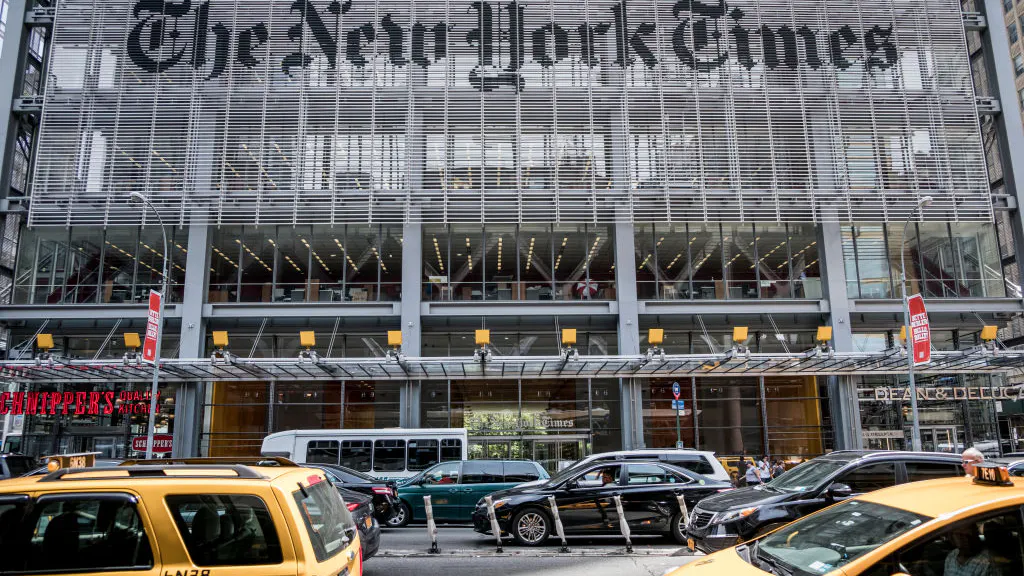On Tuesday, The New York Times ran a piece titled, “Why Iran Is In Mourning,” in which the Times attempted to put the best face on Iranian General Qassem Soleimani, opining of his funeral that there was a “unified national outpouring that is reserved for a small handful of figures in any country, I mean a beloved president, a civil rights leader like Martin Luther King in the United States…” The Times reporter theorized that the Trump administration had “miscalculated the level of admiration” that Iranians had for Soleimani, claiming that opposition figures who had been jailed by the Iranian government had said, “He was a national hero.”
Times reporter Farnaz Fassihi told host Michael Barbaro stated that Supreme Leader Ali Khameini recited the Muslim prayer for the dead during the funeral for Soleimani, adding that “in the middle of the prayer, several times he paused and openly cried. And the crowd also wept very loudly with him.” Fassihi continued, As a reporter who has covered Iran for over 25 years, what struck me was that the people who had attended were not just supporters of the regime, but a lot of people who were generally very critical of the regime … there were activist, there were opposition figures who had been jailed by the regime who attended, and when I asked them, ‘Why are you there? Why are you going?’ the response was, “General Soleimani protected our national security. He transcended politics. He was a national hero.”
Barbaro said, “What you are describing feels like the kind of unified national outpouring that is reserved for a small handful of figures in any country, I mean a beloved president, a civil rights leader like Martin Luther King in the United States, not for what our colleagues have described as a general who specializes in covert operations in Iran.”
Fassihi responded, “I think it’s difficult for most people in the United States and outside of Iran and perhaps the region to grasp the unique place and role that General Soleimani played in Iran and in regional politics. He was singlehandedly the most revered influential character in Iran.”
Barbaro asked, “So how did Soleimani cultivate that role? How did he make Iranians feel that way? Where does that story start?”
Fassihi answered that it began with the Iranian revolution in 1979, making it seem like a rags-to-riches story: “He was a young man working construction jobs … from a low income family. His education was high school diploma level and he got swept up in the revolution, in the promise of Islam becoming the foundation of the government and of promises to empower the oppressed and low income class in Iran which had been neglected and sidelined under the pre-Western monarchy of the Shah.” She stated that he rose quickly in the military ranks, “showing a lot of promise.” She continued that after the Iran/Iraq war he was named commander of the Qods forces, (the wing of the Iranian military responsible for terrorist activities across the globe), saying, “That was really the beginning of the Qods forces and Islamic Republic’s ambition to create a paramilitary in the region and to kind of export the idea of an Islamic revolution of Shia dominance outside of the borders of Iran.”
Asked why Soleimani wanted to export the revolution, Fassihi answered that the Islamic republic theocracy was the first time that a Shia government had come to power in the Middle East. Fassihi theorized that the Islamic Republic of Iran wanted to promote the Shia wing of Islam as it had been an historical minority compared to the Sunnis, adding, “As soon as they had established their government and power in the country, they started looking externally, and General Soleimani was pivotal in expanding the ambitions of Iran’s military and political apparatus in the Middle East.”
Fassihi noted Soleimani’s role in helping Hezbollah, Hamas, and Islamic Jihad, without pointing out their role as terrorist groups.
Fassihi stated that the Trump administration had been ignorant of the importance of Soleimani when they decided to kill him, saying:
I think the Trump administration may have not known what he represented to Iraq. I think they miscalculated the level of admiration, perhaps, or nationalistic sentiment that we have seen pouring out of Iran. I think White House probably thought that it was taking out a military commander that may not be very popular with ordinary Iranians, that there’s been a lot of discontent in November against the government and maybe Iranians would support this decision. For sure we have voices in Iran, outside and inside Iran among Iranians who think that taking out Mr. Soleimani out is justified and didn’t like him, but what we’ve seen is that the U.S. has effectively turned General Soleimani into a martyr.
When Barbari echoed that the U.S. may not have understood what Soleimani meant in the hearts of Iranians, Fassihi concluded that Iran had been an “island of stability in the Middle East, saying, “I think that’s absolutely right. And I think we have to remember Iran has been an island of stability in a region ablaze with terrorism and car bombs and beheadings and kidnappings and women being sold by Isis and Iranians have watched the whole region unravel around them.”
Not that you’re glorifying a monster again, but guess you can’t feature some quotes how safe his American victims felt
— Razor (@hale_razor) January 7, 2020

.png)
.png)

